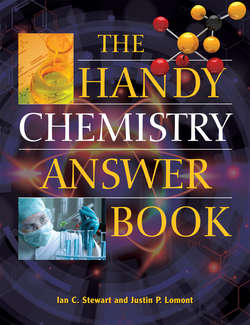Читать книгу The Handy Chemistry Answer Book - Justin P. Lomont - Страница 19
На сайте Литреса книга снята с продажи.
What is the composition of air?
ОглавлениеEarth’s atmosphere is made up of 78% nitrogen (N2) and 21% oxygen (O2), if you ignore water vapor, which shifts too much to include in averages for the entire planet. The last 1% is made up of mostly argon (Ar), followed by carbon dioxide (CO2) and other trace gases.
What gives a substance its color?
The color of a substance is the combination of the light that is reflected back at your eye. In other words, you’re seeing the light that is not absorbed by the substance. Certain frequencies can be absorbed because of the electronic structure of a substance, while others simply bounce off back into your eye.
What is a glass?
A glass is a noncrystalline solid—it lacks order in the solid state. In polymer chemistry, scientists are concerned with the glass transition temperature (Tg), which is the temperature at which a material changes from a hard to a rubbery state. What’s neat about this transition is that the material is not changing phases (i.e., from solid to liquid), but is changing from one type of solid to another.
What makes mercury so dangerous?
Mercury can be absorbed through the skin, making it particularly dangerous to handle. Organometallic mercury compounds, like dimethylmercury (CH3HgCH3), are particularly dangerous and have caused the deaths of a number of laboratory research chemists. Most research on this most toxic of mercury compounds has ceased. Be careful cleaning up that broken thermometer!
What is a vacuum?
A vacuum is space without matter. The word vacuum derives from a Latin word that means “empty.” A perfect vacuum, or one with absolutely no matter in a given space, is very hard to achieve, but through modern engineering scientists can get pretty close without having to go into deep space to run their experiments.
Can sound move through a vacuum?
No. Sound is a mechanical wave, which means that for the wave to move, actual molecules must bump into one another. In a vacuum, there is no matter, so in space, no one can hear you scream.
